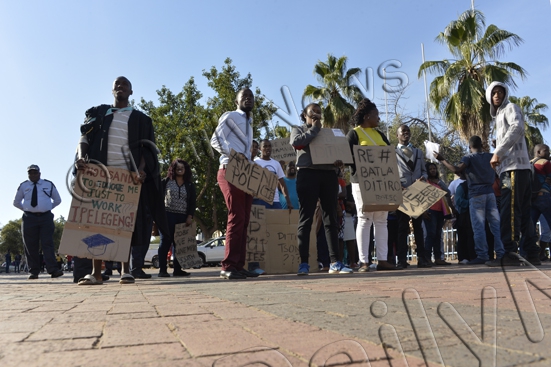Regional integration a necessity for Sustainable development
24 Dec 2019
Being highly mobile, there is no doubt that young people can influence positive change in the Southern African Development Community (SADC) region if engaged in matters of sustainable development.
They should be given chance to better their communities by coming up with ideas on how best they can be included in regional decision making. As the future front-runners, it is necessary that they integrate and share ideas and strategies on how they could induce the governments not to leave them behind. They should be encouraged to formulate policies and legislations, which could be incorporated in decision making for regional sustainable development.
Sustainable Development is perceived by many scholars as meeting the necessities of the existing community taking in to consideration the future generation. Mutual sustainable development ideas will rise to consider globalization taking in to account that people have assets as well as needs because today’s challenges go beyond the basic human needs such as health, food and education. Sustainable Development policies for the youth will have to link and integrate youth concerns to the global economy, political and economic systems, sustenance of the environment even climate change. It will therefore be easier for countries to integrate in partnership, trade and share funding strategies.
Young people interviewed spoke confidently about what they think are the significance and priorities of regional youth cooperation to accelerate their empowerment. There was a general overview that youth programs can create jobs if, first, there is sufficient job strategies creation for them and the strategies are of quality. Some of these young people perceived nepotism as a challenge common in some African countries including SADC.
They have advocated for youth leaders saying such leaders could articulate well youth unemployment in countries such as Botswana, eSwatini and South Africa. Unemployment too has been perceived by the youth as one of the biggest challenge with the repercussion of young people becoming lay abouts, resorting to crime, drugs, early pregnancy and sometimes others being kidnaped and used for ritual practices. They have advocated for youth conferences where they can share regional skills, ideas and regional policies.
As for 21-year-old Alenxandre Fumo of Mozambique, if the current generation is not given chance, they will fail the future generations.
On the part of services offered through leisure education. Boitumelo Moalafi (23), a second year student studying Early Childhood with Botswana’s Open University felt that youth’s leisure education is vital though challenging since people talk about how they have faced obstacles in life. She said she learned to be independent, assertive enough to be an overcomer in one of the conferences she had attended.
“I also will never forget the feeling of representing my organization and country and speaking on our behalf in an international conference with politicians and young people.”
Tumisang Moutlwatsi 23 also of Botswana says he has realized the importance of taking part in the community development to share knowledge. He says they have shared entrepreneurship skills, discussed traits such as playing an active role in team building activities, sports teams and youth discussion on matters of social ills which he said gave him the chance to work constructively with others. By sharing thoughts and ideas he realized that youth are a vital part of any economy.
Nineteen-year-old Akabongwe Dlamini of eSwatini, a first year student doing a Bachelor degree in Logistics and Supply Chain Management at the University of Botswana said youth unemployment is high in her country. She said the youth are trying to contribute positively to the community by resorting to entrepreneurship instead of resorting to drugs and crime in her country. She also explained that the youth leave the country because of high tax rate, advocating that the youth must be given jobs to stay in the country because the more citizen the lower the tax rate, which will lead to stable economy. She said the education system in eSwatini is not producing student who have all the necessary skills required in job market because many people seems to drop out of school due inability to pay fee.
Malawi’s Felistus Mphaka (21) said the youth policy that was amended in 2011 had as its main objective to include youth matters in the mainstream development. This was done so that young people do not idle Building of vocational centers was also emphasized in the policy where youth would be taught to focus on specific skills as entrepreneurs.
Joseph Habulezi of Zambia (20), third year student in Civil Engineering at University of Botswana said his country focuses mostly in the girl child empowerment since they are married at tender age. “I however feel that the messages from youth seminars given to youth are not effective. We need more effective ways. Some governments do not take the aspect youth empowerment as a critical matter because we do not have the young people playing key role in high positions.”
Communications and Public Relations manager for SADC Ms. Barbra Lopi said a number of policies have been developed to guide youth programs. In addition, SADC remains committed to harnessing the potential of the youth. She referred to President Hage Geingob of Namibia and outgoing Chairperson of the Southern African Development Community (SADC)’s discourse saying, "We all have to be cognizant of the fact that to unleash the enormous potential of our youth and harness the demographic dividend, we must create, within our economies, the necessary opportunities for social and economic transformation.”
She said in August 2015 the SADC Heads of State and Government adopted the Declaration on Youth Development and Empowerment, which signaled the commitment, at the highest level, to ensure that youth and the issues that particularly affect them are given due regard in regional development processes. “This was in recognition of the important role that youth should play in shaping the region’s present and future. At the same time, cognizance was taken of the fact that young people constitute the greater share of the SADC population, with those under 35 years of age accounting for about 75% of the population in the region. The fact that SADC is a very young population, is seen in the fact that the average age for the region is 19 years,” she said.
The declaration calls upon Member States to put in place measures to ensure the economic empowerment of youth through their participation in entrepreneurship and employment, according to Ms Lopi, as well as to promote healthy lifestyles among youths. She was of the view that in order to actualize these commitments, youth development and empowerment are key to regional programs being implemented in the revised Regional Indicative Strategic Development Plan (RISDP) (2015-2030). With regard to coordination of youth voices she held that SADC Youth Forum has been put in place to coordinate youth voices and strengthen their contributions to policymaking and implementation in the region. The forum is being coordinated by the Youth Council of Tanzania.
The August 2019 Summit approved the development of a comprehensive youth program to give effect to the 2015 Declaration, having taken into account the representations made by youth in the Forum, she explained.
“As the regional processes are anchored on what takes place at the national level, it is important that youth actively and responsibly participate in political and governance processes in their respective countries to ensure that their interests are prioritized. Today, with a representation rate of less than 2% only a handful of young people make it to Parliament, a situation does not auger well for youth led development, nationally and regionally.” While commenting on the aspect of equipping the youth with the knowledge of general human wellbeing, she said the SADC region accounts for more than 40% of people living with HIV and AIDS in the world and a key intervention to support youth wellbeing is the SADC Sexual and Reproductive Health and Rights (SRHR) Strategy (2018-2030).
Discussing some of the programs of SADC which have impacted the youth, she said SADC is promoting and supporting youth participation across the different sectors of the regional economy, such as infrastructure, manufacturing and agriculture. She further said SADC has promoted the involvement of youth in the infrastructure sector regionally which enabled their participation in the 9th SADC Multi-Stakeholder Water-Energy-Food (WEF) Nexus Dialogue in March 2019.
Asked whether there are some SADC countries which have no or little programs of the youth she said all countries in the region are implementing several youth development programs. These programs she said included those on youth innovation, entrepreneurship, leadership and participation as seen in the Innovation Hubs established in Botswana, South Africa and eSwatini.
Meanwhile, alluding to some of the challenges of the youth in the region, Botswana’s Ministry of Youth Empowerment, Sports & Culture Development Mr Keabetswe Lesiela said currently, the SADC’s Youth Employment Promotion Policy Framework is a guiding framework that guides how the SADC region can collectively address the challenges faced by the youth. Botswana is currently hosting the BOLESWA Youth in Cooperatives Exchange Program that has brought together youth from Botswana, Lesotho and Swaziland to exchange learnings and benchmark, he emphasized, saying the efforts, coupled with others, go a long way in addressing the youth of the region's problems.
He also said the SADC YPPF aims at improving employment opportunities of youth in the region, their entrepreneurial capabilities and that the Botswana National Youth Policy (revised in 2010), is due for review in the year 2020. “This exercise will allow for a more robust and up to date Policy that will guide the Youth empowerment and development initiatives in Botswana. Botswana National Youth Council provides strategic leadership on youth advocacy, and it is affiliated to regional and other bodies that deal with youth matters (SADC, AU and Commonwealth).”
Unemployment is a great challenge for Botswana, standing at an average of 25.1% for 18-35 year old age category, this is higher than the national average, which stands at 17.8% for the age category above 18 years, Mr Lesiela Further explained. Mr Lesiela further said HIV/AIDS, alcohol and substance abuse were major problems leading to unemployment of young people in nationally and regionally. ENDS
Source : BOPA
Author : Idah Basimane
Location : Gaborone
Event : Interview
Date : 24 Dec 2019








